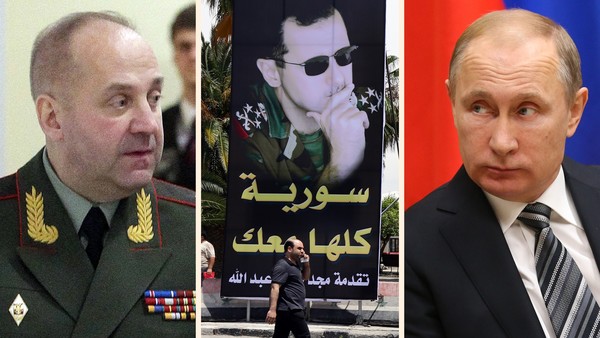First up, from The Interpreter:
Live Updates: The Kremlin has denied claims published by the Financial Times that the late GRU chief, Igor Sergun, had travelled to Syria to ask, without success, that Bashar al-Assad step aside.
The previous post in our Putin in Syria column can be found here.
The Kremlin has denied claims published in today's Financial Times that Bashar al-Assad had rejected a Russian request that he leave office late last year.
The state-owned TASS news agency reported that Dmitry Peskov, President Putin's press secretary, said "no, this is not so."
Two unnamed "senior Western intelligence officials" reportedly gave the Financial Times details of a trip visit by the late director of the GRU, Igor Sergun.
According to the report, Sergun proposed Assad step aside as part of a managed transition:And from the Financial Times, January 22, 2016 11:55 am:
A choreographed transition of power that would maintain the Alawite regime but open the door to realistic negotiations with moderate rebels.However, back in mid November, Russian officials were strident in their support for Assad remaining in power, even days after the signing of the Vienna declaration that envisaged a timetable for free elections.
On November 18 Bashar al-Assad told an Italian television station that, in contrast to the plan outlined in Vienna, any timetable for transition would only begin after "defeating terrorism."
Of course, according to Assad, all of the armed opposition is terrorist and therefore there could be no role for them in peace talks.
Despite this, the Russian foreign minister, Sergei Lavrov, twice reiterated the Kremlin's support for Assad's prerogative in any negotiations.
While the Financial Times today cited claims that Russia had actually become disillusioned with the regime after entering the war directly, and was seeking a way out, the situation on the ground looks very different....MORE
Igor Sergun was asked by Vladimir Putin in 2015 to propose to Bashar al-Assad that he step down. The answer was no
Just weeks before his death on January 3, Colonel-General Igor Sergun, director of Russia’s GRU military intelligence agency, was sent to Damascus on a delicate mission.The general, who is believed to have cut his teeth as a Soviet operative in Syria, bore a message from Vladimir Putin for President Bashar al-Assad: the Kremlin, the Syrian dictator’s most powerful international protector, believed it was time for him to step aside.Mr Assad angrily refused.
Two senior western intelligence officials have given the FT details of Sergun’s mission. The Russian foreign ministry referred a request for comment to the defence ministry, which said it was unable to comment.
But on Friday, in response to a question from a Russian journalist asking if Mr Putin asked President Assad to step down, a spokesman for Mr Putin said: “No, that’s not so.”
Russia’s failed gamble in Damascus left Mr Assad more entrenched than before, and hopes for a diplomatic solution to the vicious civil war appear again to be ebbing away.
UN officials have spent the past week lowering expectations that the talks between the warring factions planned for January 25 in Geneva will go ahead, let alone produce a diplomatic breakthrough.
It is a dramatic reversal of fortunes. News of the secret proposal delivered by Sergun — a choreographed transition of power that would maintain the Alawite regime but open the door to realistic negotiations with moderate rebels — added to a growing mood of optimism among western intelligence agencies in late 2015.
For the US-led coalition fighting Isis, it seemed that accommodating Moscow could break years of diplomatic deadlock over Mr Assad’s removal — a move Washington views as a precondition to cooling the sectarian tensions in Syria and Iraq that have fed the jihadi insurgency.
Moscow’s military intervention in the conflict in support of Damascus in late September, many in Europe and the US reasoned, had reached its limit. “Mr Putin had taken a look under the bonnet of the Syrian regime,” one senior European intelligence official told the FT “and found a lot more problems than he was bargaining for.”
However, Russia overplayed its hand, the official said, and Mr Assad made clear to Sergun that there could be no future for Russia in Syria unless he remained as president.

In his dealings with the Kremlin, Mr Assad has adopted a strategy of playing one foreign power off against another. His trump card on this occasion was Iran. Russia has been nervous of Tehran’s growing regional influence at the cost of its own leverage for months.People close to the Syrian regime say suspicions about Russia’s intentions have been growing in Damascus for some time. “That mood of elation when Russia first got involved lasted for a while, but then people got more pessimistic,” said one Damascus businessman. “Assad’s people started to realise that having the big brother defending them meant he could also demand things of them too.”
Mr Assad has also been scrupulous in rooting out any powerful figures who might one day stand as an alternative to his leadership.
The disappearance of Abdel Aziz al-Khair, an Alawite dissident, was a striking example, said Joshua Landis, a Syria analyst from the University of Oklahoma.
Mr Khair, a leading member of the National Co-ordinating Body, a political grouping dedicated to negotiating with Mr Assad to achieve democratic change, was from a prominent family in Mr Assad’s home town, said Mr Landis.
“He went to Moscow in 2012 and then he went to Beijing. It seemed clear to everyone they were checking him out as a potential Alawite replacement to the current regime that could assure the Alawite community,” Mr Landis said. On his return to Damascus he was taken from the airport by security agencies.

“That seemed to be a sign that Assad was not going to allow Russia to pick the next president,” Mr Landis added....MUCH MORE
